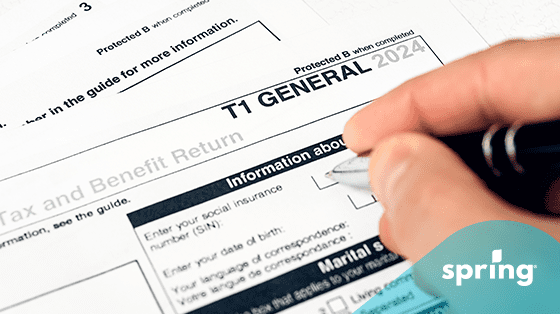One of the biggest factors in whether or not a lender will approve you for a mortgage is your credit score. Your credit score is a number between 0 and 900 that’s been calculated by a credit bureau to assess the likelihood you’ll pay your bills on time. In a nutshell, the higher your credit score the more trustworthy you look to potential lenders. That said, if you’re a first-time home buyer who needs CMHC insurance, then your credit score will need to be at least 600.
What’s the Minimum Credit Score to get Approved for a Mortgage in Canada?
In order to be approved for a mortgage in Canada, you typically need a credit score of at least 600. This is the current minimum credit score set by the Canadian Mortgage and Housing Corporation (CMHC), which provides mortgage loan insurance on certain mortgages in Canada.
CMHC mortgage loan insurance is required if the home’s purchase price is less than $1,500,000 and you’re putting down less than 20% of the purchase price. In order to qualify for CMHC mortgage loan insurance, at least one borrower must have a credit score equal to or greater than 600.
Not all homebuyers will require CMHC mortgage loan insurance, however, most banks and private lenders will also require a minimum credit score above 600.
The minimum credit score needed to be approved for a mortgage in Canada will vary from situation to situation, and lender to lender, but it’s a safe bet to assume you’ll need a credit score between 600 and 700 to qualify.
Don’t know your credit score? Check and monitor it for free at Borrowell.
What’s the Easiest Bank to get a Mortgage with in Canada?
There’s no shortcut to getting approved for a mortgage. Every bank in Canada will assess your application slightly differently, so it’s not a bad idea to shop around a bit. Each one will potentially offer different loan amounts and interest rates.
There’s a misconception that too many inquiries about loans or mortgages on your credit file can actually hurt your credit score but it’s just that—a misconception. According to Equifax (one of the two credit reporting bureaus in Canada), multiple inquiries on your credit score in a short period of time are counted as one inquiry, especially for things like mortgage approvals. This window of time allows rate shopping, so make sure you take advantage of it.
Banks vs. Mortgage Brokers: Which One is Better?
If you’re hunting around for a mortgage don’t overlook mortgage brokers. While you may have a long relationship with your existing bank and you feel this will work in your favour, potentially increasing your chance of approval, that’s not necessarily the case.
Banks are only able to offer their own mortgage products, whereas mortgage brokers have access to multiple products from a wide range of banks and lenders. They basically shop around and negotiate for you, potentially connecting you with better rates and higher loan amounts.
What Credit Score is Needed to Buy a House in Canada?
When it comes to buying a house in Canada, the credit score required will vary from situation to situation. For instance, the price of buying a single-detached house in BC or Ontario will be dramatically different than in Alberta or Quebec.
The higher the purchase price of the home, the greater the mortgage amount the average buyer will require. To get approved for a high mortgage amount, you’ll not only need to meet some high standards for income, but you’ll also need a very high credit score. This is because, with a higher loan amount, lenders are assuming greater risk.
|
Province |
Minimum Credit Score for Mortgage Approval |
|
Ontario |
600 |
|
British Columbia |
600 |
|
Quebec |
600 |
|
Alberta |
600 |
Table: The minimum credit score required for mortgage approval won’t change too much depending on your province or territory.
While some lenders will look for a credit score of above 600, the absolute minimum credit score Canadians should have before applying for a mortgage—regardless of their province or territory—is 600. But your income and the required mortgage amount are other important factors (among others) that will determine the outcome of your mortgage application.
How Much Income do you Need to Qualify for a $500,000 Mortgage in Canada?
When you’re applying for a mortgage, banks and lenders will look at your debt-to-income ratio to understand the state of your personal finances. This assessment determines whether you’ll be approved and for how much.
For example, someone with a high income and high debt might be approved for a lower mortgage amount than someone with a lower income but no debt.
As a general guideline, most financial experts recommend that no more than 30% of your gross annual income go towards housing expenses. For a $500,000 mortgage to be considered affordable, you’d need an annual income of around $150,000.
Most major banks and lenders have mortgage affordability calculators available online. You can use these to at least get a sense of the mortgage amount you might be able to afford.

Can You Get a Mortgage with a Credit Score Below 600 in Canada?
If your credit score falls below 600 you’re going to have a tough time getting approved for a mortgage through a bank. However, you do have some options. Here’s a look at some steps you can take.
1. Work with a Private Lender through a Mortgage Broker
If you have bad credit and can’t get a mortgage with a bank, you can try working with a mortgage broker to see if some private lenders are willing to offer you a mortgage instead. These lenders are more open to taking on some increased risk but in exchange, the interest rates may be higher—so before you sign anything make sure you’re confident you can afford the payments at the terms they’re offering.
2. Increase the Size of your Down Payment
This isn’t an option for everyone. You might even be hoping to buy a house with no down payment. However, sometimes lenders are more willing to work with someone who has bad credit if they’re in a position to put down a sizeable portion of cash towards the purchase of a home. Typically this means having a down payment in the vicinity of 20% of a home’s purchase price.
3. Have a Co-signer or Guarantor
If you have bad credit, you can consider asking a trusted friend or family member who has good credit to be a co-signer or a guarantor. This is a big request and shouldn’t be made lightly. Many people aren’t comfortable taking on the additional risk and responsibility to cover someone else’s mortgage. In order to get approved with a cosigner, there’s no specific credit score that you need to have, it’s more based on the cosigner’s credit score than yours. However, as you pay the loan, it helps your credit score.
A co-signer is someone who signs all mortgage documents and their name will appear on the home’s title, alongside the purchaser. They essentially co-own the home and if mortgage payments aren’t made, the co-signer is held responsible. A guarantor doesn’t appear on the home’s title but they’re held responsible if mortgage payments aren’t made.
How to get a Mortgage with Bad Credit in Canada
If you have bad credit or no credit, buying your own home will be a challenge. Even if you explore some of the other options available to you, such as private lenders or asking a family member to be a co-signer, you might face an uphill battle.
The best thing you can do if you have bad credit or no credit is to begin building good credit habits right away by following some of these tips.
1. Don’t Miss Payments
Your payment history is the biggest contributor to your credit score. If you’re in the habit of frequently missing payments on your credit cards or other loans, your credit score will be impacted. Make a plan to always pay your bills on time, even if it means cutting some spending or services, or working with your lenders to make bill payments dates more manageable.
2. Limit your Credit Spending
Another major factor in how your credit score is calculated is the percentage of revolving credit you’re using that’s available to you. For instance, if you have a credit limit of 10,000 dollars and you’re regularly maxing out your cards, your credit score will take a hit. Instead, limit your credit spending so that you’re only ever using under 35% of the credit available to you.
3. Sign up for a Credit-Building Program
One of the simplest ways to build up good credit is to use an online credit-building service. These services specialize in helping you build and maintain good credit. With one of these services, the goal is to put on your credit report a track record of making payments on time consistently. Once you’ve signed up, you’re required to make small manageable payments over a period of time and each payment gets directly reported to credit bureaus.
4. Consider a Secured Credit Card
In similar fashion, a secured credit card is another smart way to build credit quickly. When you apply and sign up, you pay the card’s maximum limit as a cash deposit, so you’re not really borrowing more credit and there’s no risk for the credit card issuer. You can then use the credit card as you normally would. As long as you’re making the payments on time, you’ll be building good credit one payment at a time.
Credit Scores and Mortgage Rates
While it’s difficult to determine how your credit score affects the interest rate on your mortgage, it’s safe to say the higher your credit score, the lower the interest rate. In order to get the best possible rate, you should have a credit score of at least 760. If your credit score is lower than that, then you aren’t likely to get the best-advertised rate.
Get Approved Today
If you want to get on the property ladder, Spring Financial can help. Take the first step towards owning your own home—explore mortgage options with Spring today!








